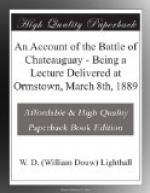The Duke of Kent, who was commanding at Halifax, kept a friendly eye upon him, and gave him much personal advice, on one occasion dissuading him from an inadvisable marriage. He now took him into his own regiment. De Salaberry still saw rough service, was shipwrecked, served in the West Indies again, and then fought in Europe and the disastrous expedition to Walcheren, where he was placed in the most advanced posts.[13] Returning to his 60th, he was made captain in 1799. “I have often heard say,” narrates De Gaspe, “that his company and that of Captain Chandler were the best drilled in the regiment.” In the West Indies he was drawn into a duel which caused him sorrow until his dying day, for in it he was forced by the “code of honor” to kill a German fellow-officer, and bore a scar of the affair ever after on his forehead. It is related that by his great strength he cut the German in two.
“The prodigious force with which he was endowed,” says Sulte, “had made of him an exceptional being in the eyes of the soldiers,” and when he returned to Canada after West Indian service of eleven years[14] a little before the war of 1812, he was already the hero of the French-Canadians. That the stories of his strength and vigor are true is corroborated by every circumstance which has been perpetuated about him. His ruddy, energetic face is preserved in portraits among his family, and his walking-stick, said to be an enormous article, is kept at Quebec in the collection of the Literary and Historical Society.
De Salaberry’s Voltigeurs were organized at a peculiar juncture. “The discords between French and English in Quebec had emboldened the United States,” says Garneau, “and the English Governors harassed the French. An opposite conduct might bring back calm to men’s spirits. The Governor of Nova Scotia, Sir George Provost, a former officer, of Swiss origin, offered all the conditions desirable.... Arriving at Quebec, Sir George Provost strove to introduce peace and to remove animosity. He showed the completest confidence in the fidelity of the French-Canadians, and studied how to prove at every opportunity that the accusations of treason which had been brought against them had left no trace in the soul of England nor in his own.... Soon the liveliest sympathy arose between Sir George Prevost and the people."[15] It was in pursuance of this policy that the order to raise the Voltigeur force was given by him.
While Hampton was at Four Corners, Sir George, thus now Commander-in-Chief of all the forces in Canada, was at the camp which had just been formed at La Fourche, and of which a description is given by Mr. Sellar in his history of the district. Sir George was a man quite devoid of the decisiveness necessary to a soldier, and though, as we have seen, he was useful in reconciling the French, his errors in military matters several times brought disgrace on the British forces, and gave rise to storms of rage and disgust




